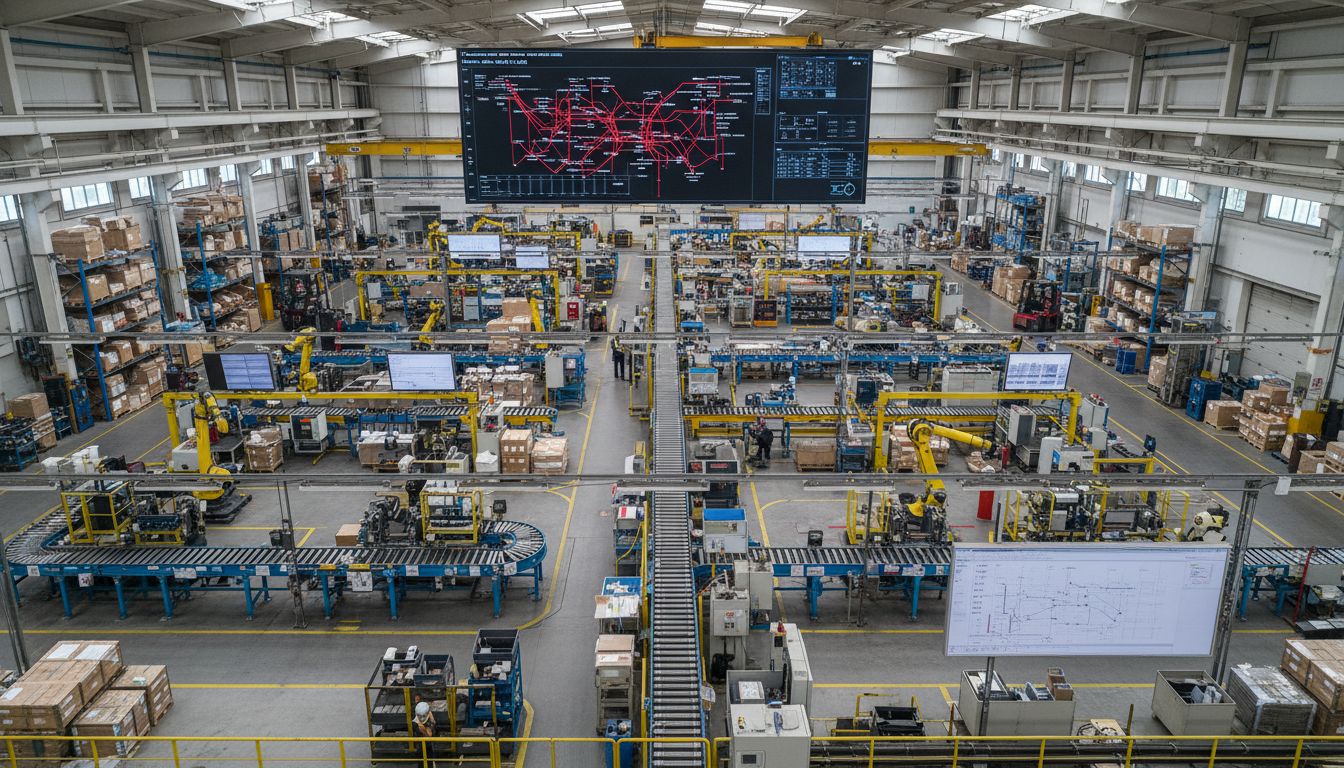7 Types of AI Automations to Boost Your Business

AI automation is changing how companies work and compete. Businesses using these systems can cut operating costs by up to 40 percent. Most people think this surge in efficiency means robots will take over every desk. The real advantage is actually about humans—because when AI handles the boring tasks, your team can focus on what truly matters.
Table of Contents
- Introduction To AI Automation
- Robotic Process Automation (RPA)
- AI-Powered Chatbots And Customer Service
- Predictive Analytics For Business Decisions
- Automated Marketing Solutions
- Workflow Automation For Team Collaboration
- AI In Financial Management And Reporting
Quick Summary
| Takeaway | Explanation |
|---|---|
| AI enhances operational efficiency. | Employing AI automation streamlines repetitive tasks, reduces errors, and enables teams to focus on strategic initiatives. |
| RPA reduces operational costs significantly. | Robotic Process Automation (RPA) can lower costs by up to 40% while improving accuracy and speed of operations. |
| AI chatbots improve customer interaction. | AI-powered chatbots provide immediate, personalized support while reducing customer service response times by 20%. |
| Predictive analytics informs decision-making. | Using predictive analytics helps organizations anticipate trends, mitigate risks, and make better-informed strategic decisions. |
| Workflow automation boosts team collaboration. | Automating workflows enhances communication and task management, creating more responsive and efficient team environments. |
1: Introduction to AI Automation
As business landscapes become increasingly complex, artificial intelligence automation presents a transformative opportunity for companies seeking strategic advantages. AI automation represents a powerful approach to streamline operations, enhance productivity, and unlock new levels of operational efficiency.
At its core, AI automation is about empowering businesses to work smarter, not harder. By leveraging intelligent technologies, companies can automate repetitive tasks, reduce human error, and free up valuable team members to focus on high-impact strategic initiatives. Owner-led AI adoption strategies are critical in ensuring successful implementation.
The landscape of AI automation offers multiple pathways for business growth and optimization. Key considerations for implementation include:
- Understanding your specific business needs and challenges
- Identifying processes most suitable for AI-driven automation
- Ensuring your team is prepared and trained for technological integration
According to research from the U.S. Small Business Administration, businesses that strategically implement AI automations can experience significant performance improvements. These improvements are not about replacing human workers, but augmenting their capabilities.
Successful AI automation demands a human-centric approach. Business owners must remain actively involved, using AI as a tool to enhance decision-making and operational efficiency. The goal is creating a collaborative environment where technology amplifies human expertise, not diminishes it.
By exploring different types of AI automations, businesses can discover tailored solutions that align with their unique operational requirements and strategic objectives. The following sections will dive deep into specific automation strategies that can revolutionize your business performance.
2: Robotic Process Automation (RPA)
Robotic Process Automation (RPA) represents a groundbreaking approach to streamlining business operations through intelligent software robots that mimic human interactions with digital systems. Unlike traditional automation, RPA goes beyond simple rule-based tasks, offering sophisticated digital workforce capabilities that can transform organizational efficiency.
RPA technology enables businesses to create software robots capable of handling repetitive, rule-based digital tasks across multiple applications and systems. These digital workers can operate 24/7, significantly reducing human error and accelerating process completion times. Explore AI adoption strategies to understand how RPA can be integrated strategically.
Typical business processes ideal for RPA implementation include:
- Data entry and migration between systems
- Invoice processing and financial reconciliation
- Customer onboarding and support ticket management
- Compliance reporting and documentation
According to research from the U.S. Small Business Administration, RPA can help businesses reduce operational costs by up to 40% while improving accuracy and processing speed. The key is not to replace human workers, but to empower them by eliminating mundane, repetitive tasks.
Successful RPA implementation requires a strategic approach. Business owners must carefully map existing processes, identify automation opportunities, and design RPA solutions that complement their team’s skills. This means understanding not just the technological capabilities, but also the specific workflow nuances unique to your organization.
RPA is not a one-size-fits-all solution. It demands thoughtful integration, continuous monitoring, and periodic optimization to ensure maximum effectiveness. By viewing RPA as a collaborative tool that augments human capabilities, businesses can unlock unprecedented levels of operational efficiency and strategic agility.
3: AI-Powered Chatbots and Customer Service
AI-powered chatbots are revolutionizing customer service by providing instant, intelligent, and personalized interactions that transform how businesses engage with their clients. These sophisticated digital assistants go beyond traditional customer support methods, offering round-the-clock assistance and remarkable efficiency.
Future-proof your business with AI strategies by understanding how chatbots can dramatically enhance customer experience and operational productivity. Modern AI chatbots leverage natural language processing and machine learning to understand context, interpret customer inquiries, and provide accurate, contextually relevant responses.
Key advantages of implementing AI chatbots include:
- Immediate response times
- Consistent customer interaction quality
- Scalable support across multiple communication channels
- Reduced operational support costs
According to research from Harvard Business School, AI chatbots can reduce customer service response times by approximately 20%. However, successful implementation requires more than just technological deployment. It demands a strategic approach that balances automated efficiency with human empathy.
Businesses must carefully design chatbot interactions to ensure they complement, rather than replace, human customer service representatives. This means creating intelligent escalation protocols that seamlessly transfer complex inquiries to human agents, maintaining a high-touch customer experience.
The most effective AI chatbots are those that continuously learn from interactions, adapting their responses based on customer feedback and evolving communication patterns. By treating chatbots as dynamic learning systems rather than static scripts, businesses can create more responsive, intelligent customer service solutions that truly meet modern consumer expectations.
4: Predictive Analytics for Business Decisions
Predictive analytics represents a powerful AI-driven approach that transforms raw data into strategic business intelligence, enabling organizations to anticipate future trends, mitigate risks, and make informed decisions with unprecedented precision. By leveraging advanced machine learning algorithms, businesses can now move beyond reactive strategies to proactively shape their operational landscape.
Explore strategic AI adoption challenges to understand how predictive analytics can become a cornerstone of your business intelligence framework. Modern predictive analytics goes far beyond traditional statistical modeling, integrating complex data sources to generate nuanced insights that drive competitive advantage.
Key domains where predictive analytics delivers transformative value include:
- Financial forecasting and risk management
- Customer behavior prediction
- Supply chain optimization
- Inventory and resource allocation
According to research published in PubMed, predictive analytics can dramatically improve organizational decision-making by providing data-driven insights that reduce uncertainty and enhance strategic planning. The true power of predictive analytics lies not in replacing human judgment, but in augmenting decision-makers’ capabilities.
Successful implementation requires a holistic approach that combines sophisticated AI technologies with deep domain expertise. Business leaders must carefully curate data sources, ensure robust data quality, and develop sophisticated models that can adapt to changing market dynamics.
Predictive analytics is not a static tool but a dynamic system that continuously learns and refines its predictive capabilities. By treating these analytics as an evolving intelligence platform, businesses can create a responsive, forward-looking decision-making infrastructure that turns data into a strategic competitive advantage.
5: Automated Marketing Solutions
Automated marketing solutions represent a transformative approach to business growth, leveraging artificial intelligence to create personalized, data-driven marketing strategies that dramatically enhance customer engagement and campaign effectiveness. These intelligent systems go beyond traditional marketing techniques, offering unprecedented precision and scalability.
Discover how to build real marketing value with AI and unlock your business’s full potential through sophisticated marketing automation technologies. Modern AI-powered marketing solutions can analyze vast amounts of customer data, predict behavior patterns, and generate highly targeted marketing campaigns with remarkable accuracy.
Key capabilities of automated marketing solutions include:
- Dynamic customer segmentation
- Personalized content generation
- Real-time campaign optimization
- Intelligent customer journey mapping
According to research from Cornell University, AI enables businesses to process and manipulate complex marketing data in ways that were previously impossible. The goal is not to replace human creativity, but to amplify marketing teams’ strategic capabilities.
Successful implementation requires a nuanced approach that balances technological sophistication with human insight. Businesses must carefully design AI marketing systems that respect customer privacy, maintain ethical standards, and create genuine connections.
By treating automated marketing solutions as collaborative tools, companies can develop more responsive, intelligent marketing strategies that adapt in real-time to changing customer preferences and market dynamics. The future of marketing lies not in automated systems that operate in isolation, but in intelligent platforms that empower human marketers to achieve extraordinary results.
6: Workflow Automation for Team Collaboration
Workflow automation represents a sophisticated approach to enhancing team collaboration, leveraging artificial intelligence to streamline communication, reduce manual processes, and create more intelligent, responsive organizational ecosystems. By integrating intelligent systems, businesses can transform traditional collaborative environments into dynamic, efficient platforms that adapt to team needs in real-time.
Explore strategic challenges in AI workflow integration to understand how sophisticated automation can revolutionize your team’s productivity. Modern workflow automation goes beyond simple task management, creating interconnected systems that learn, predict, and optimize team interactions.
Key elements of effective workflow automation include:
- Intelligent task routing and prioritization
- Real-time collaboration tracking
- Automated documentation and knowledge sharing
- Performance insights and predictive workload management
According to research from MIT’s Center for Information Systems Research, AI-driven workflow automation is fundamentally about enhancing human capabilities, not replacing them. The most successful implementations create symbiotic relationships between technological systems and human creativity.
Successful workflow automation requires a nuanced approach that respects individual team dynamics while providing structure and efficiency. Businesses must design systems that are flexible, transparent, and aligned with their unique organizational culture.
By treating workflow automation as a collaborative intelligence platform, companies can create more adaptive, responsive working environments. The future of team collaboration lies not in rigid automated systems, but in intelligent platforms that empower teams to work smarter, communicate more effectively, and achieve extraordinary results through seamless human-AI partnership.
7: AI in Financial Management and Reporting
AI-powered financial management represents a revolutionary approach to transforming complex financial processes, enabling businesses to achieve unprecedented levels of accuracy, efficiency, and strategic insight. By integrating intelligent technologies, organizations can move beyond traditional accounting methods to create dynamic, predictive financial ecosystems.
Discover AI strategies for business leaders to understand how advanced financial technologies can drive strategic decision-making. Modern AI financial tools go far beyond basic number-crunching, offering sophisticated analysis that turns raw financial data into actionable business intelligence.
Key capabilities of AI in financial management include:
- Real-time financial risk assessment
- Automated compliance monitoring
- Predictive cash flow modeling
- Intelligent expense categorization
According to research from the U.S. Department of the Treasury, AI technologies are transforming financial management by enhancing both opportunities and operational capabilities. The critical insight is that AI should augment human financial expertise, not replace strategic human decision-making.
Successful implementation requires a balanced approach that combines technological sophistication with deep financial understanding. Businesses must design AI systems that are transparent, ethical, and aligned with their specific financial goals and regulatory requirements.
By treating AI financial tools as collaborative platforms, companies can create more adaptive, intelligent financial management systems. The future of financial reporting lies not in automated reports, but in dynamic intelligence platforms that empower financial professionals to make more informed, strategic decisions with unprecedented speed and accuracy.
Below is a comprehensive table summarizing the seven types of AI automations and their key business benefits as covered in the article.
| AI Automation Type | Main Purpose | Key Benefits/Outcomes |
|---|---|---|
| Robotic Process Automation (RPA) | Automate repetitive digital tasks using software robots | Reduces operational costs by up to 40%, eliminates errors, accelerates processes |
| AI-Powered Chatbots & Customer Service | Provide instant, personalized, automated customer support | 24/7 service, reduces response times by 20%, enhances customer experience |
| Predictive Analytics | Transform data into actionable business insights | Enables strategic, data-driven decisions, trend anticipation, risk mitigation |
| Automated Marketing Solutions | Streamline and personalize marketing activities | Data-driven campaigns, precise targeting, higher engagement without replacing creativity |
| Workflow Automation for Collaboration | Optimize team processes and communication | Intelligent task management, improved transparency, more responsive and efficient teamwork |
| AI in Financial Management & Reporting | Enhance accuracy and insight in financial operations | Real-time risk assessment, predictive modeling, compliance, supports faster strategic moves |
| AI Automation Strategy | Owner-led, human-centric tech integration | Frees staff for strategic work, augments decision-making, fits unique business requirements |
Ready to Turn AI Automation Into Real Business Results?
If reading about the 7 types of AI automations makes you wonder how to move from learning to doing, you are not alone. Many business owners face the challenge of choosing the right tools while worrying about complexity, wasted effort, and team pushback. This article highlights the need for owner-led strategies, seamless integration, and reducing operational headaches by automating repetitive tasks. These are all goals our team at Average Robot is designed to help you reach.

Now is the time to act. Let our experts guide you with proven AI-driven automations, step-by-step roadmaps, and hands-on support. Stop letting confusion hold you back. Discover personalized solutions that empower your team, eliminate busywork, and give you a real strategic edge. Visit Average Robot and book your first consult today to see how you can use these 7 automations to boost your business right now.
Frequently Asked Questions
What is AI automation and how can it help my business?
AI automation uses intelligent technologies to streamline operations, enhance productivity, and improve efficiency by automating repetitive tasks, allowing team members to focus on strategic initiatives.
How does Robotic Process Automation (RPA) work in business?
RPA involves using software robots to perform rule-based digital tasks across applications, significantly reducing human error and processing time while operating 24/7.
What are the benefits of using AI-powered chatbots for customer service?
AI-powered chatbots provide instant, personalized responses, improve response times, maintain consistent interaction quality, and reduce operational support costs, thus enhancing the overall customer experience.
How can predictive analytics improve my business decision-making?
Predictive analytics transforms raw data into actionable insights, allowing businesses to anticipate trends, mitigate risks, and make informed decisions with greater accuracy, ultimately enhancing strategic planning.




